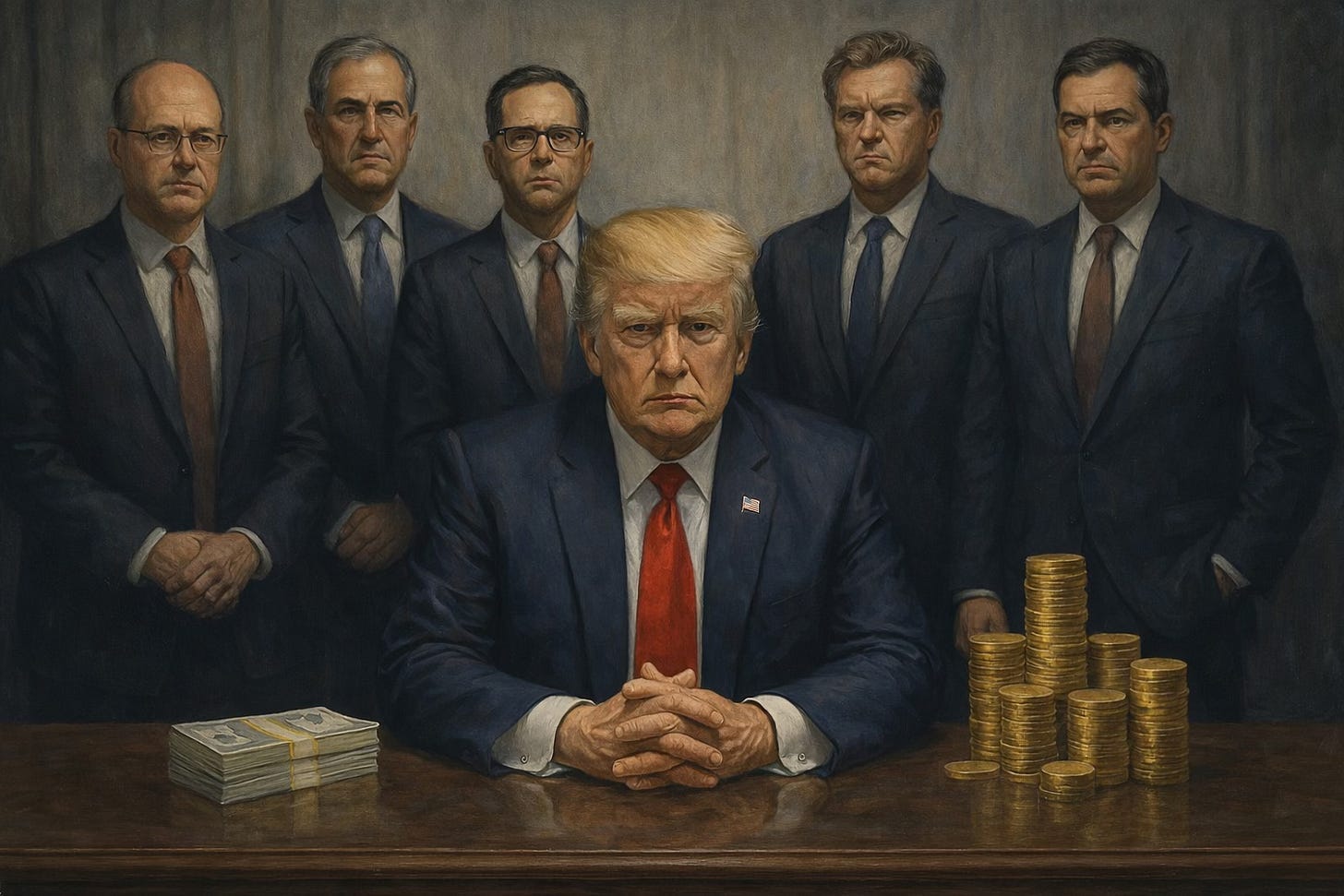Trump’s $7.5B Cabinet
Public service has never been this profitable.
Trump’s second administration reads like a Forbes billionaire’s club roster, only with government titles attached.
The combined net worth of his Cabinet advisors reaches $7.5 billion before even counting Trump’s own $5.5 billion.
For comparison, Biden’s 2021 Cabinet tallied around $110 million combined.
Howard Lutnick ($3.3B) now runs Commerce after rebuilding Cantor Fitzgerald from the ashes of 9/11. Linda McMahon ($3.3B), who turned WWE from regional wrestling into a global entertainment empire, has been handed the Department of Education.
Scott Bessent, a hedge fund manager who once placed macro bets for George Soros, enters as Treasury Secretary with $600M.
Doug Burgum sold his software company to Microsoft during the dot-com boom for $100M. Chris Wright built Liberty Energy into a fracking powerhouse worth another $100M.
Even the smaller players are wealthy by political standards. Lori Chavez-DeRemer built medical practices that generate $6M annually, sitting on $35M.
Marco Rubio, with a modest $1.5M net worth, looks like the token poor guy.
When your Commerce Secretary made billions in finance and your Treasury Secretary mastered hedge fund strategies, economic policy gets filtered through a very specific lens.
These aren’t academics studying markets. They’re operators who built fortunes by riding, manipulating, and profitingfrom them.
Trump himself illustrates the shift perfectly. His memecoin launch in January boosted his liquidity by $100M overnight. His World Liberty Financial venture added hundreds of millions more.
Shortly afterward, he signed the GENIUS Act to provide stablecoin regulatory clarity.
The president is literally writing rules for markets in which he is an active participant.
Lutnick steered Cantor Fitzgerald into real estate and crypto. Now, as Commerce Secretary, he shapes trade negotiations and regulatory policy that affect his firm’s bottom line.
McMahon built her career selling entertainment but is now tasked with dismantling public education.
Bessent made fortunes betting against currencies and now directs U.S. monetary policy.
Wright fracked his way to nine figures and now oversees energy.
What’s striking is how recent most of this wealth is.
These aren’t old money dynasties. They are fortunes built in the last 20-30 years, fueled by financialization, tech booms, energy extraction, and media consolidation.
Burgum sold at the peak of the dot-com bubble. Wright rode the fracking wave. McMahon capitalized on cable television’s expansion.
Lutnick rebuilt during the largest bond bull market in history.
They are products of the same system they now govern: deregulation, market speculation, and consolidation of power.
JD Vance ($12M) exemplifies the pattern. He rose from poverty, wrote Hillbilly Elegy, and then built wealth in venture capital before entering politics.
His story suggests that the road from poverty to power now runs through capital markets, not public service.
Even the smaller fortunes tell the same tale. Pam Bondi tripled her net worth during a six-year break from government by consulting for corporations and cashing in on Trump Media shares.
Previous administrations at least pretended that public service required personal sacrifice. Officials placed assets in blind trusts, took pay cuts, and spoke of the greater good.
Trump’s team dropped that pretense entirely.
Pete Hegseth left Fox News with a pay cut, but his wife’s producer salary softened the blow. Sean Duffy runs Transportation while holding Bitcoin and precious metals.
RFK Jr. oversees health policy while owning $1.6M in crypto.
This Cabinet’s wealth concentration is historically unprecedented. No administration has ever been so explicitly plutocratic.
The conflicts of interest are not obstacles to be managed, but the very design of the team.
Unlike traditional oligarchies built on inherited titles or land, this one grew out of markets. These billionaires understand leverage, volatility, and systemic risk.
That sophistication makes them potentially more dangerous than the old political elite.
The real experiment is whether American democracy can survive being governed by the very people who profited most from its unraveling.


